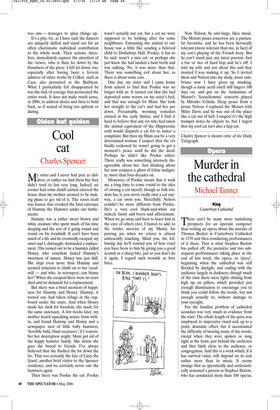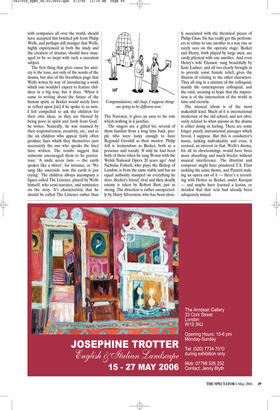Murder in the cathedral
Michael Tanner
King
Canterbury Cathedral
There canŌĆÖt be many more tantalising prospects for an operatic composer than writing an opera about the murder of Thomas Becket in Canterbury Cathedral in 1170 and then conducting performances of it there. That is what Stephen Barlow has pulled off, the premi├©re and two subsequent performances taking place at the end of last week, the opera, or ŌĆśpieceŌĆÖ, beginning when the cathedral was still flooded by daylight, and ending with the audience largely in darkness, though much of the time there were lights shining from high up on pillars, which provided just enough illumination to encourage you to think you could follow the words, but not enough actually to, without damage to your eyesight.
For the familiar problem of cathedral acoustics was very much in evidence from the start. The whole length of the quire was employed, to impressive visual and, up to a point, dramatic effect, but it accentuated the difficulty of hearing many of the words, except when they were spoken or sung right at the front, just behind the orchestra and thus fairly close to the audience, or congregation. And this is a work which, if it has survival value, will depend on its text rather more than its music. It seems strange that as operatically and ecclesiastically seasoned a person as Stephen Barlow, who has conducted more than 100 operas, with companies all over the world, should have accepted this botched job from Philip Wells, and perhaps still stranger that Wells, highly experienced in both the study and the creation of dramas, should have managed to be so inept with such a succulent subject.
The first thing that gives cause for anxiety is the tone, not only of the words of the drama, but also of the breathless page that Wells writes by way of introducing a work which one wouldnŌĆÖt expect to feature children in a big way; but it does. ŌĆśWhen it came to writing about the future of the human spirit, as Becket would surely have us reflect upon [sic] if he spoke to us now, I felt compelled to ask the children for their own ideas, as they are blessed by being poor in spirit and fresh from God,ŌĆÖ he writes. Naturally, he was stunned by their responsiveness, creativity, etc., and so the six children who appear fairly often produce lines which they themselves (not necessarily the one who speaks the line) have written. The results suggest that someone encouraged them to be portentous: ŌĆśA smile never lasts ŌĆö the earth quakes like a shiverŌĆÖ, for instance, or ŌĆśWe sang like asteroids: now the earth is just cryingŌĆÖ. The children always accompany a figure called The Listener, played by Wells himself, who semi-narrates, and ruminates on the story. ItŌĆÖs characteristic that he should be called The Listener rather than The Narrator, it gives an aura to his role which nothing in it justifies.
The singers are a gifted lot, several of them familiar from a long time back, people who were lucky enough to have Reginald Goodall as their mentor. Philip Joll is tremendous as Becket, both as a presence and vocally. If only he had been both of those when he sang Wotan with the Welsh National Opera 20 years ago! And Nicholas Folwell, who plays the Bishop of London, is from the same stable and has an equal authority stamped on everything he does. BecketŌĆÖs friend, rival and then deadly enemy is taken by Robert Burt, just as strong. The direction is rather unexpectedly by Harry Silverstein, who has been close ly associated with the theatrical pieces of Philip Glass. He has really got the performers to relate to one another in a way one so rarely sees on the operatic stage. Becket and Henry, both played by large men, are easily physical with one another. And even HenryŌĆÖs wife Eleanor, sung beautifully by Kate Ladner, and all too clearly brought in to provide some female relief, gives the illusion of relating to the other characters. They all sing in a mixture of the colloquial, mainly the contemporary colloquial, and the vatic, seeming to hope that the impression is of the intersection of the world in time and eternity.
The musical idiom is of the most makeshift kind. Much of it is international modernist of the old school, and not obviously related to what anyone in the drama is either doing or feeling. There are some longer purely instrumental passages which brood, I suppose. But this is conductorŌĆÖs music, lacking individuality and even, it seemed, an interest in that. WellsŌĆÖs drama, for all its shortcomings, would have been more absorbing and much briefer without musical interference. The librettist and composer might have pondered T.S. Eliot tackling the same theme, and Pizzetti making an opera out of it ŌĆö thereŌĆÖs a recording with Hotter as Becket, under Karajan ŌĆö and maybe have learned a lesson, or decided that that vein had already been adequately mined.















































 Previous page
Previous page